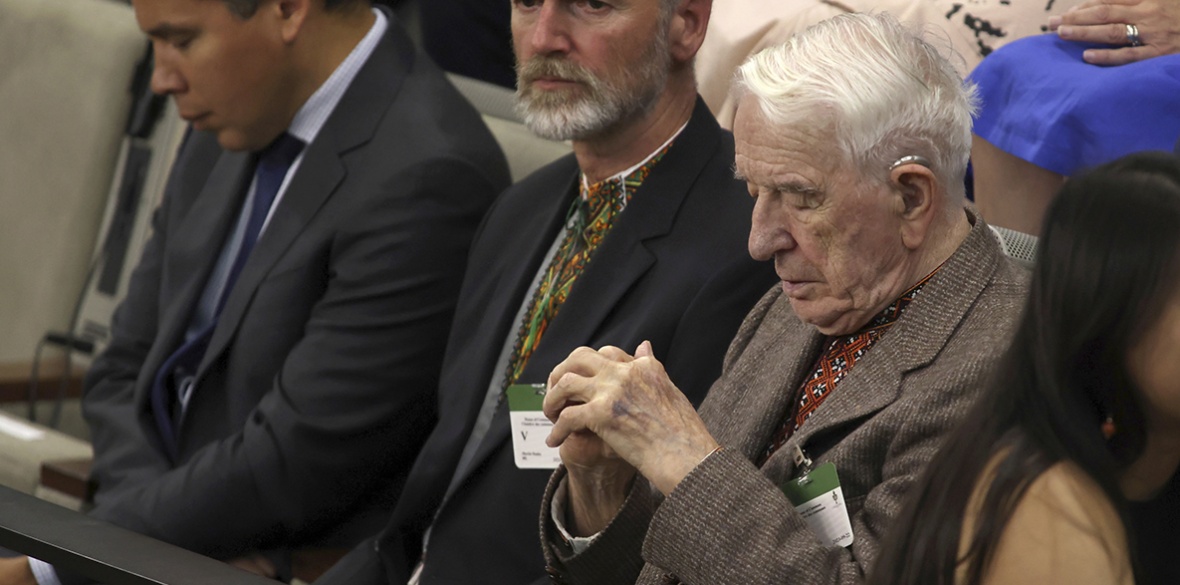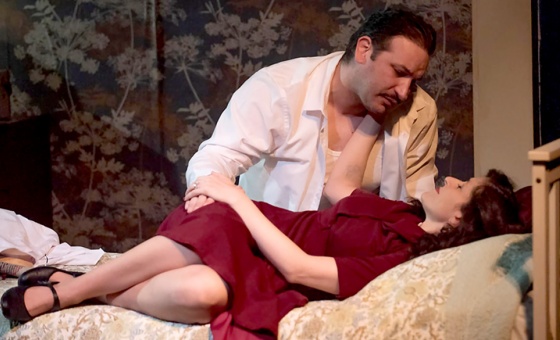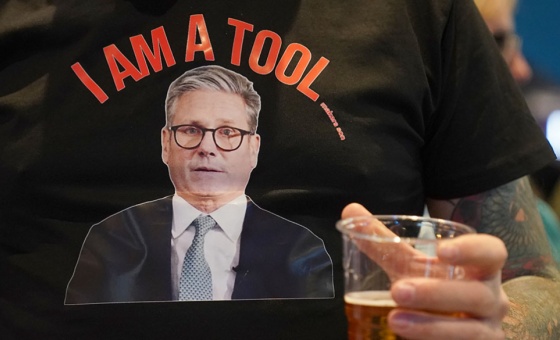This is the last article you can read this month
You can read more article this month
You can read more articles this month
Sorry your limit is up for this month
Reset on:
Please help support the Morning Star by subscribing here
IF THE standing ovation in the Canadian House of Commons to 98-year-old Yaroslav Hunka, a former Ukrainian Nazi fighter, has come as shock to some, it’s because they simply weren’t paying enough attention.
You are a “Ukrainian hero,” the now disgraced former Canadian speaker of the house Anthony Rota told Hunka, to rapturous applause.
Prime Minister Justin Trudeau, admittedly no intellectual heavyweight, and his ministers feigned ignorance of Hunka’s wartime service for the Third Reich in the 14th Galicia Division of the Waffen SS, despite Rota’s clear introduction of the Ukrainian as a fighter against the Russians during the second world war.
Any Canadian secondary school student with a history book could have spotted that awkward anomaly.
This was not simply a “gaffe” or an “embarrassing mistake” but an inevitable result of the conscious rewriting of 20th century history that casts certain theatres of WWII as a precursor to the current Russia-Ukraine conflict.
In this narrative, Ukrainian fascists — perpetrators of genocide against Jews, ethnic Poles and Russians — have their crimes repackaged as a heat-of-the-moment misjudgement in an age-old fight for Ukrainian independence against Russian imperialism.
However, it’s not just Canada’s Establishment that needs to be held to account for this shameful celebration.
The bigger picture is that Hunka’s tale is part of a sordid story of cold war collusion between the decaying British empire and the defeated remnants of Ukrainian fascism.
Hunka lived in Northamptonshire for several years after the war, working as an aircraft fitter. He married his Warwickshire-born wife Margaret in 1951, before emigrating to Canada in 1954.
How did this happen, and why is the mainstream British media so uninterested in investigating this episode in Hunka’s life?
During Hunka’s time in England, he was an active member of the Association of Ukrainians in Great Britain (AUGB). This group, which exists to this day operating from offices in London’s Notting Hill Gate, attracted so many former Waffen SS members that an affiliated group, the Association of Ukrainian Former Combatants in Great Britain (AUFC), was formed on July 30 1949 in London.
At its height, the AUFC had as many as 5,800 members organised in 74 branches and 52 groups across Britain. According to the website ukrainiansintheuk.info, 84 per cent were former soldiers of the Waffen SS Galicia Division.
In his book, The Waffen SS: Hitler’s Elite Guard at War, 1939-1945, the military historian George H Stein noted the contrast between the gullible enthusiasm of the Ukrainian nationalists to volunteer for the Nazis’ Galician Division, as Hunka did, with the uncomfortable reality that, according to Nazi racial theories, these troops, unlike their Dutch or Scandinavian Waffen SS counterparts, were “non-Aryans.”
“On April 28, 1943, a call went out for volunteers for a ‘Galician’ SS division. The response was overwhelming: nearly 100,000 Ukrainians volunteered, fewer than 30,000 of whom were accepted. Although a special effort was made to limit recruiting to that part of German-occupied Poland which had before 1919 been Austrian Galicia, the fact remained that the division was composed of Ukrainians; the euphemistic designation 14th SS-Freiwilligen-Division ‘Galizien’ fooled no-one, least of all the personnel of the division, who were mostly Ukrainian nationalists. But after years of Slav-baiting it was difficult for the SS leaders to admit that they had created an SS division of ‘subhumans’.”
Stein even quotes Hitler, to whom Hunka — as with all SS volunteers — swore a personal oath of allegiance, disparaging the Galicia Division in savage terms: “If it is composed of [former] Austrian Ruthenians, one can do nothing other than immediately to take away their weapons. The Austrian Ruthenians were pacifists. They were lambs, not wolves. They were miserable even in the Austrian Army. The whole business is a delusion.”
Indeed, in their very first action, the Ukrainians were decimated by the Soviet Red Army’s 1st Ukrainian Front at the 1944 Battle of Brody.
Falling back into Nazi-occupied Slovakia, the Galician Division took part in unsuccessful rearguard efforts to hold back the Soviets, while in the meantime helping the Germans to repress the 1944 anti-fascist Slovak national rising.
Retreating as fast as they could, they reached Slovenia in Yugoslavia, where the partisan resistance led by the Yugoslav communists was wreaking havoc among the fascist forces.
Replenished by new forces, the 14th SS Division, newly rechristened the 1st Division of the Ukrainian National Army, reached Austria and in May 1945 surrendered to the British, who interned approximately 11,000 Ukrainians across the Italian border in Rimini.
According to Howard Margolian, author of Unauthorized Entry: The Truth about Nazi War Criminals in Canada, 1946-1956, a concerted effort was made to prevent the Ukrainian SS members from facing jail or death for treason in the Soviet Union.
“Having been captured in German uniform, most faced certain repatriation to the USSR. In the end, however, only about three thousand were actually sent back. The reason was the intervention of powerful forces. Shortly after the termination of hostilities in Europe, General Pawlo Shandruk, the former leader of a Nazi-sponsored Ukrainian ‘national liberation committee,’ contacted Archbishop Iwan Buchko, a high-ranking prelate in Rome who specialised in Ukrainian affairs. Describing the former SS soldiers as good Catholics and fervent anti-communists, Shandruk implored Buchko to intervene on their behalf. The archbishop agreed to try. During a special audience with Pope Pius XII, Buchko pleaded the division’s case. The pontiff was very sympathetic and promised to contact the appropriate British authorities. As a result of the Vatican’s efforts, London agreed to change the Ukrainians’ POW status to that of surrendered enemy personnel, a seemingly minor distinction, but one that freed the British from their repatriation obligations under the Yalta agreement.”
In addition, the confusion over the Ukrainians’ citizenship proved to be a lifesaver for the likes of Hunka.
During muddled interrogation procedures conducted by British officers, the bureaucrats endlessly refined the national definitions used to categorise the Waffen SS POWs, with one document insisting that “Ukrainian” was not a nationality.
In her work, “Undetermined” Ukrainians — Post-War Narratives of the Waffen SS Galicia Division, Olesya Khromeychuk quotes from a British internal document that suggested: “If it is desirable to refer either to former inhabitants of the Ukraine by nationalities, or to nationalities by their geographical relationship, the expression Soviet (Ukrainian), Polish (Ukrainian), Roumanian (Ukrainian) or Czech (Ukrainian), or Stateless (Ukrainian), may be used. For persons formerly living in the Ukraine, but whose nationality has not yet been established, the expression Ukrainian ‘Undetermined’ may be used until such time as they are classified as being of a definite nationality or as being Stateless.”
This was literally a “get-out-of-jail-free” card for most of these Waffen SS prisoners. There could be no question of returning undetermined or stateless individuals to either Poland or the USSR.
This created the technical loophole some in Whitehall needed to bring the Waffen SS fighters to Britain and then later to disperse them to friendly subordinate countries such as Canada.
Although born in the Polish state in 1925 in a village that had been returned to the Soviet Union in 1939, and from which he volunteered for the SS in 1943, a certain “Jaroslaw Hunka” set sail on June 14 1954 on board the Arosa Star for his new life in Canada. He was registered as a “stateless” person.











